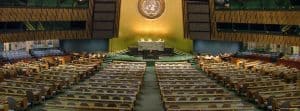The Lavin Agency Speakers Bureau
A speakers bureau that represents the best original thinkers,
writers, and doers for speaking engagements.
A speakers bureau that represents the best original thinkers,
writers, and doers for speaking engagements.
If we want a truly equal democracy, we must reject the obsession with group identity—and acknowledge that what we have in common is greater than what divides us.
Our democracies today are in search of true equality, says Yascha Mounk—it’s both our greatest challenge and our greatest hope. In the pursuit of equality, a growing number of people have begun to define themselves in terms of their group identities (such as race or sexual orientation). But the Johns Hopkins professor, whose previous book was recommended by Barack Obama in his influential Summer Reading List, says that’s actually counterproductive to our goal. He calls this “the identity trap,” and in his new book of the same name, he argues that our search for equality is not helped but harmed when we obsess over group identity, when we stifle discourse, and when we deny that members of different groups can truly understand each other. Injustice towards minority groups is real, he says, and we must address it. But we can’t stop there. In talks, Yascha shows us how to escape the identity trap and keep fighting for a future in which “what each of us can accomplish—and how we all treat each other—no longer depends on the groups into which we were born.” Kirkus calls The Identity Trap “a passionate book about how the things we have in common are greater than the things that divide us,” and Harvard professor Henry Louis Gates, Jr. says that it “brings vital context to some of the most fraught and divisive debates of our time.”
“Brave and necessary…Yascha honestly confronts challenges to democracy, while refusing to give in to pessimism.”— Anne Applebaum, The Atlantic
Yascha Mounk is a Professor of the Practice of International Affairs at Johns Hopkins University, the Founder of Persuasion, and the host of The Good Fight podcast. He writes a weekly column for his over 100,000 subscribers on his Substack. During these politically turbulent years, he has emerged as one of the foremost thinkers on democracy: its workings and its consequences.
His most recent book, The Identity Trap, is a thoughtful and comprehensive look at identity politics and social justice. In it, he argues that although appreciating the culture and heritage of minority groups is vital for our democracy, a new ideology is on the rise: one that puts too much emphasis on group identity, and in doing so, deepens polarization and threatens our democracy. He shows how this “identity synthesis” is actually counterproductive to true equality, and why we must subject it to a serious critique: “one that is open to taking its most useful contributions on board, but ultimately insists on striving for a more ambitious and optimistic vision of the future.” Harvard’s Henry Louis Gates, Jr., writes that “Yascha Mounk and I don’t agree on everything, inevitably, but I very much admire his aim to take seriously a set of ideas that have been subject to much more heat than light. Social identities connect us in multiple and overlapping ways; they are not protected but betrayed when we turn them into silos with sentries.” The Identity Trap was named to The Economist‘s Best Books of 2023, The Financial Time‘s Best Books of 2023 (Politics), and Inc.‘s Non-Obvious Book Awards.
His previous book, The Great Experiment: Why Diverse Democracies Fall Apart and How They Can Endure, offers an in-depth understanding of an urgent problem, and genuine hope in humanity’s ability to solve it. Yascha explains that humans are “groupish” in nature, tending to create different groups and bond fiercely with other group members. If we can channel this tendency in a productive fashion, creating bridging identities that allow us to bond with people who are different from us, then we can form a democracy built on genuine mutual solidarity—one where all members are equal and work together to meet the challenges in front of us. Applying international lessons to the United States, Yascha enables us to see our political and social situation with fresh eyes. Legendary political scientist Francis Fukuyama calls The Great Experiment “a blueprint for a more optimistic future,” and former president Barack Obama named it to his 2022 Summer Reading List.
His other books include The People vs. Democracy: Why Our Freedom Is in Danger and How to Save It, in which he predicted the rise and danger of authoritarian populism before anyone else and provided a guide for acting and fighting for our rights and freedoms.
Yascha writes for The Atlantic, The New York Times, The Wall Street Journal, and CNN, among others. For Slate, he writes “The Good Fight” column and hosts the corresponding podcast on populism, resistance, activism, and the changing face of democracy. He is a professor at Johns Hopkins University, where he holds appointments in both the School of Advanced International Studies and the SNF Agora Institute, a Contributing Editor at The Atlantic, a Senior Fellow at the Council on Foreign Relations, and the founder of the publication Persuasion.
Yascha’s talk was the highlight of our First Amendment of the 21st Century Conference. It generated an enormous amount of dialogue among the attendees. Thank you. I'll be following your work with renewed interest.
The Pittsburgh Foundation
One of America's Foremost Experts on the Declaration of Independence Award-Winning Author, Disunion Among Ourselves

Harvard Economist MacArthur Genius Studying Economic Opportunity Director of Opportunity Insights

Historian New York Times Bestselling Author of Humankind: A Hopeful History, Utopia for Realists, and Moral Ambition

Author of Grit, the #1 New York Times Bestseller | Pioneering Researcher on Grit, Perseverance, and the Science of Success

2024 Nobel Prize Winner | 3rd Most Cited Economist in the World | Bestselling Co-Author of Why Nations Fail and Power and Progress

Harvard Business School Behavioral Science Professor | "40 Under 40 MBA Professor" | Author of TALK: The Science of Conversation and the Art of Being Ourselves

#1 New York Times Bestselling Co-Author of Abundance | Host of thePlain English Podcast | Founder of the Substack Derek Thompson

#1 New York Times Bestselling Author of How the Word Is Passed and Above Ground | The Atlantic Staff Writer

Questions around our innate group identities are dominating the national conversation: Should Black children be made to socialize with other Black children? Should your gender identity determine whether you get medical treatments first?
Yascha Mounk, a leading thinker on democracy and author of The Identity Trap, argues that this focus on group identity is not helping but hindering our progress towards true equality. In fact, this movement—which he calls the “identity synthesis”—is actually deepening our political polarization and betraying the ideals of social justice that it’s built on.
Drawing on his extensive research and insight, Yascha explores the pitfalls of this mentality and offers a fresh perspective. He argues that we must value the culture of minority groups and fight for an end to the injustices they face. But focusing on group identity isn’t the way towards equity—we must move towards a future where “what we have in common finally comes to be more important than what divides us.”

The United States and many other democracies in the world are amid a historically unprecedented experiment: For the first time, deeply ethnically and religiously diverse democracies are trying to treat all their members as true equals.
In this talk, political scientist and democracy expert Yascha Mounk will draw on history and psychology to show why it is so difficult to build thriving democracies. Human nature pushes us to build groups and favor their members over outsiders—for American democracy to succeed, we need to find ways to channel this tendency in a productive direction. Recognizing the importance of cultural and religious groups while building the connective tissue which can remind us of what we have in common.
Yascha also teaches us that recognizing the difficulty of building truly equal democracies can also make us more hopeful for the future. By heeding the insights presented in this talk and building on the progress of the past decades, America can create a vision of a future society that citizens would be excited to live in.

To Yascha Mounk, we are facing a global crisis. Support for liberal democracy has fallen markedly across Western Europe and North America—and this development is especially stark in the U.S., and especially amongst its youth. Mounk’s research is unsettling. Two-thirds of Americans born in the 1930s and 40s state that living in a democracy is absolutely paramount. But less than one third of Americans born in the 80s or 90s would agree. Twenty years ago, 1 in 15 Americans desired military rule. Today, this number is 1 in 6. And yet, the alternatives to liberal democracy are grim. Populist, authoritarian parties erode the checks and balances of the rule of law, the judiciary system and free press. They discard the rights of citizens and push more people out of the sphere of politics. And they ride waves of racial animosity, promising violence, or imprisonment, for those who resist.
In this timely, necessary talk, Mounk outlines how these forces arise—and, vitally, what we can do to combat them. It’s an interconnected story of economics, ethnicity, and technology: of lost jobs, insecurity, increasing automation, and a flattened standard of living; of mono-ethnic societies transforming into multi-ethnic states; of the erosion of civic education and the fraught truth of social media. For corporations, colleges, associations, as much as for average, concerned citizens, Mounk provides actionable steps to stand up to the forces of populism: from getting involved in civic life to campaigning for meaningful candidates, from donating to anti-authoritarian movements to organizing in your community. Ultimately, it’s about realizing that democracy is fragile—and impermanent. And that if we continue to take it for granted—if we don’t stand up for it now—it will no longer exist.